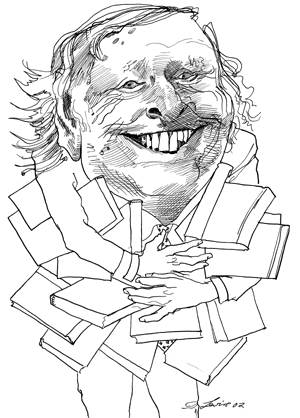No one will ever write a biography of consequence about Rich Lowry. While remembrances of William F. Buckley Jr., the founder of National Review, often speak of the void in conservative commentary he left behind upon his death in 2008, few of them hazard to ask whether at least the mediocrity of his heir at the magazine may have been his own fault. After all Buckley picked Lowry in 1997 over two promising young conservatives who went on to careers of influence and significance: David Brooks and David Frum. Bright as they might have been, Sam Tanenhaus writes in Buckley, his authorized but strikingly candid biography, both had clear demerits in Buckley’s eyes. “I said that I thought it would be wrong for the next editor to be other than a believing Christian,” Buckley told National Review’s board. “George [Will] agreed and added that the next editor should not be a Canadian.” Brooks and Frum, Jewish Canadians, were thus ruled out. Lowry it was.
This snapshot of the American conservative movement fits within a larger view that most people left of center already took for granted even before Donald Trump began his political rise: that the right is animated substantially, and perhaps fundamentally, by ugly and irrational prejudices. Conservatives who protest that the charge is unfair often cite the example Buckley set in his work and his life.
Whatever his flaws, they say, Buckley brought an enlightened conservative movement into being, one that has since been debased by figures like Trump and his sycophants. As Tanenhaus understands well, the stakes of Buckley—a book that was about three decades in the making and weighs it—are that it might help us make sense of the turn toward Trumpism and the character of the American right more broadly. “In his time, as in our own, no one really could say what American conservatism was or ought to be,” Tanenhaus writes. “Buckley himself repeatedly tried to and at last gave up. But for almost half a century, millions of Americans could confidently say who had been the country’s greatest conservative: William F. Buckley, Jr.”
Buckley was born in 1925, the fifth of ten siblings who survived infancy, to Aloise Steiner of New Orleans and William F. “Will” Buckley Sr., a Texas schoolteacher turned lawyer, investor, and oil speculator. In the years immediately before his son’s birth, Will, working in Mexico, had backed counterrevolutionaries with money and help smuggling arms into Baja California. At the revolution’s end he was deported with a million dollars in debt and a memento he later shared wistfully with his children: an architect’s sketch of a palacio he’d dreamed of building in the country with his riches. Instead he remodeled the family’s estate in Sharon, Connecticut:
To step inside was to be transported to another world—the floor of inlaid blue mosaic tiles, the potted trees and hanging plants, vines that coiled upward, their tendrils curling around the iron railings of the balcony on the second floor where the children’s bedrooms were….
More than a handsome estate, it was a meticulously curated vision. “To get to the root of Bill Buckley,” a friend later said, “you’ve got to understand that he’s a Catholic aristocrat of the Spanish persuasion.”
But while he spent some of his childhood abroad—a born member of a cosmopolitan, transatlantic elite—Buckley never let his peers forget that he was, in fact, an American. Upon arriving at an English boarding school in 1938, he unfurled a five-foot-long American flag and hung it behind his bed—a “proud symbol of his patriotism and also of the Buckley family’s shared opposition to the war,” Tanenhaus explains. That stance drew him into arguments with teachers there and, upon his return to the US, at Millbrook, a Hudson Valley prep school. He joined the America First Committee at fourteen and made his first public speech (Millbrook had a public speaking requirement), a defense of Charles Lindbergh: “Although some of Lindbergh’s beliefs may be considered debatable he should be admired for his courage and sincerity.” The beliefs in question included white supremacy, and Buckley soon clarified which side he was on. “Scientific tests,” he declared at a school debate, “have proved that the negro has a ten-percent lower I.Q. than the whites.”
Though he took to debates with a wit and ferocity honed at his crowded family table, the young Buckley was by all accounts as shiftless as he was bright. He flunked his entrance exam to Millbrook twice, the second time after persuading his tutors to abbreviate his study schedule so he could compete in sailing races. But his academic work eventually improved, as did his vocabulary; to make up for late instruction in English (his third language, after Spanish and French), he began memorizing the obscure words that would ornament his later writing. And after a very brief stateside stint in the military near the war’s end, which he mostly spent processing discharges and supervising the training of illiterate inductees—“It really keeps you busy,” he wrote his father, “especially because they are so extremely stupid”—he finally landed at Yale. He and his debate team partner Brent Bozell quickly made names for themselves on the debate team, though, per Tanenhaus,
his style of mockery cost him points with judges. So did his platform antics, needling the opposite team by “pretending he was playing a violin while his opponent was speaking or by removing a handkerchief,” as if to dab at his tears.
His bearing on the debate stage was as arresting as all he said: “archly formal yet charmingly disheveled, jacket open, arms akimbo, rising on his toes, fingers absently massaging a gleaming Texas buckle as he drawled out cutting phrases.”
He also put his flair for theatrics to use as chairman of the Yale Daily News. In 1949, in response to an exhaustively reported exposé published in The Harvard Crimson about the FBI’s surveillance of Yale faculty for Communist activity, Buckley contacted the agency to devise a PR counteroffensive, culminating in his moderation of an on-campus event where agents were invited to dismiss the charges and answer student questions. One of the agents expressed his appreciation in a memo to J. Edgar Hoover. “I am very much impressed with William Buckley,” he wrote. “I have a very definite feeling that we will hear from this young man in years to come.”
They didn’t have to wait long. Within days Buckley was a featured speaker at an event put together by Merwin Hart, a friend of his father’s and one of the cantankerous anti–New Deal businessmen backing the publications and organizations of the burgeoning conservative movement. His speech was about left-wing indoctrination on campus. “The subject had been a staple in the conservative press since the 1930s,” Tanenhaus notes.
But Bill Buckley came before them not as a reporter for the Chicago Tribune or a cankered elder but as the consummate inside voice of a rising generation: Yale’s undergraduate king, bearing news of what was going on, not in the thirties (ancient times), but now, at this very moment, within the ivory towers.
Even as suspected Communists were being investigated and purged from their posts in academia, American colleges, Buckley claimed, were being suffocated by “an intellectual collectivist atmosphere,” which threatened more than the quality and integrity of American higher education—the very future was at stake. “Hundreds of thousands of students leave the universities every year, and their influence pervades the entire country,” he warned.
They get jobs with the government, with newspapers, with the civil service. In a very few years the intellectual collectivist drive of the universities is translated into legislative and public policy. You and I are the sufferers.
These were the ideas that made Buckley one of the early pioneers of campus sensationalism, a line of punditry that remains lucrative to this day. But the book that expanded on his arguments, God and Man at Yale (1951), departed from familiar nostrums about the importance of intellectual diversity and open discourse. Academic freedom, Buckley argued, wasn’t a sound ideal that Yale and other universities had strayed from but a mere “superstition” that universities could never plausibly uphold. “Yale (and my guess is most other colleges and universities) does subscribe to an orthodoxy,” he wrote. “There are limits within which its faculty members must keep their opinions if they wish to be ‘tolerated.’” And Yale, he contended, had an obligation to reject leftism and remain true to the traditional values of its alumni and trustees. That meant ridding curricula of left-wing materials and dismissing subversive liberals on the faculty, such as the historian Ralph Turner, whose commentaries in class filled students with “suspicions and doubts about religion,” or the sociologist Raymond Kennedy, who similarly used “pernicious techniques to undermine the tenets of Christianity.” One of these “pernicious techniques” was a Kennedy one-liner: “All I know about heaven is it must be awfully crowded there!”
God and Man at Yale was an instant sensation and a best seller—thanks partially to an advertising campaign substantially financed by Buckley’s father. That help aside, Buckley was genuinely intriguing—a bold, fresh-faced young writer in an ideological tradition dominated by old cranks. “Bill Buckley,” Dwight Macdonald wrote in a profile,
combines opportunism and conviction in a sometimes bewildering way…. Earnest-eyed, grim-lipped, lanky and ascetic, he is passionate about first principles, articulate to an almost frightening degree, and would obviously rather argue than eat.
As Tanenhaus details, Buckley took that preternatural confidence with him onto the speaking circuit, addressing
American Legion halls, women’s Catholic committees, Holy Name societies, Knights of Columbus chapters, the US Flag Day Committee, the Ad-Sell League of Oklahoma City (“Closed Membership of 800 Top-Flight Business and Professional Men”)…. He might or might not be the best new conservative writer and talker, but he was fast becoming its most entertaining—and possibly represented a new kind of public figure: not precisely a journalist or commentator or analyst but a performing ideologue.
He was also becoming a political operator, writing attack ads and speeches on behalf of Joseph McCarthy. In the 1954 book McCarthy and His Enemies, he and his former debate partner and now brother-in-law Brent Bozell took up the task of defending McCarthy’s inquisitions, “minimizing his misstatements and falsifications, the smears and name-calling—all of it the pardonable excesses of an honorable man doing important work,” Tanenhaus writes.
Buckley gained even more readers as a syndicated columnist and as the founder and editor of National Review, launched in 1955 as a more stylish and sophisticated answer to liberal magazines and journals of opinion than the ragtag conservative publications already on the market. With a respected house organ, he believed, conservatism could be pushed further into the political mainstream.
Though Buckley continued to write prolifically to that end, it was television—the debates during his 1965 run for New York City mayor, those infamous exchanges with Gore Vidal in 1968, perennial appearances on late-night programs, and his own show, Firing Line—that made him a household name from the late 1960s on. “He had the virtue, rare among American intellectuals, of never talking down to his listeners, no matter who they were,” Tanenhaus writes. “He confidently assumed—knew from experience—that audiences were alive to his particular music: the arcane vocabulary and ornate syntax, the fanciful imagery, the irony, the weave of logic and sophistry.” And as he worked to draw more Americans to conservative viewpoints through discussions on the air, Buckley was also drawing closer to the Republican establishment.
Even so Buckley was less a savvy Washington insider pulling strings than a respected voice with pointed and often unsolicited opinions to share, an impressively large Rolodex, and, under Ronald Reagan, editorship of the president’s favorite magazine. Yet he gradually lost ground to both the coarser reactionaries of the New Right, with its rising crop of pundit-entertainers like Rush Limbaugh, and the neoconservatives, who propped up their own magazine, The Weekly Standard, in the mid-1990s and their own president in 2000, as Buckley entered a semiretirement from public life. “Buckley’s column remained his one consistent platform, and he mounted it to make an unexpected break with his party over the second Iraq war in 2003,” Tanenhaus asserts.
Untethered to President George W. Bush—the only administration insider he knew was Donald Rumsfeld, from the Bohemian Grove—he was detached as well from its outer ring of champions and celebrants. He had ceded the role of propagandist to others and, freer now, had entered the winter season, with its bright clarity.
Tanenhaus uncharacteristically misses the mark here. Buckley’s writings on Iraq were in fact murky and muddled, and usefully so for the war’s backers. While he voiced skepticism about the war as a nation-building project, he supported the invasion—“If Mr. Bush has correctly analyzed the best interests of the United States, he will proceed to take action to remove Saddam Hussein,” he wrote in January 2003—and argued for deference to Bush as the nation’s commander-in-chief even as his case for the war and the situation in Iraq unraveled. “There is no point in arguing for withdrawal,” he wrote in January 2005, “unless Mr. Bush beckons us to do so.”
On the whole Tanenhaus’s portrait of Buckley’s later views and activities is sketchy. Only a few dozen of the book’s more than eight hundred pages of body text are dedicated to the last twenty or so years of his life. But the story Tanenhaus most wants to tell—the rise and rise of Buckley and his movement—ends in the mid-1980s. He tells that story richly, giving life to a host of confidants and confederates just as fascinating, including conservative luminaries like Willmoore Kendall and Whittaker Chambers and less heralded figures like the mercurial, mudslinging ex-Communist Willi Schlamm, who helped shape National Review before falling out with Buckley, and Bozell, who left Buckley’s camp even more dramatically as he fell further into radical antiabortion activism and mental illness.
The conservative movement, Tanenhaus makes clear, was the product of many hands. The vision of Buckley as its leader that emerges from his narrative is one not of a commanding general but of a baton twirler at the head of a long procession. “Buckley’s true métier as writer and talker—eventually reaching levels approaching genius—was for intellectual comedy,” Tanenhaus argues, “an almost continual repartee.” This is one of his more charitable passes at making the point that Buckley wasn’t as smart as he labored to seem. “Buckley’s function,” he says elsewhere, “had never been to give theoretical substance to the movement. He was not its best or most serious thinker. He was its most articulate voice.” There are variations on this idea throughout the book, perhaps most pointedly in the account of The Revolt Against the Masses, Buckley’s lone, abortive attempt at an original work of conservative political philosophy. The draft he turned in to a publisher was a mess, and it would remain unfinished.
It is odd, though, given that assessment of Buckley’s talents, that Tanenhaus includes so little material from Firing Line, which will likely be his most enduring legacy. Thanks to YouTube, those who may never read Buckley’s columns or books can watch him make and fake his way through debates on gun control, inequality, abortion, campus politics, and other issues that sound remarkably and perhaps depressingly familiar to contemporary ears, though marked by a civility nostalgic conservatives and liberals alike pine for. Many who never bought Buckley’s conservatism were sold on the fantasy of public discourse he offered—the noise and tumult of politics reduced to the volume of parlor discussion. But for all the cordiality he and his guests displayed while chatting about the issues driving America apart, the country was, in fact, being driven apart. A larger, more impressive crop of public intellectuals and a more edifying political media were able to speak more ably to that moment’s discord than ours can now, but they could not tame it. As eloquent as Buckley and his peers were, their finely chosen words and manners did not prevent the seeds of our current political climate from taking root.
Buckley for his part was an unapologetic ideologue—a self-declared enemy of unearned comity and bipartisan consensus. He fought tooth and nail to establish conservative hegemony in America and understood Firing Line as a part of that project. He also understood it as theater. This reveals itself in the show’s more unmoored moments: a wild-eyed Timothy Leary in beads telling Buckley, “I want to turn you on and drop you out”; Allen Ginsberg, accompanying himself on accordion, singing an unprompted Hare Krishna mantra for an uninterrupted minute; Milton Henry, first vice-president of the Republic of New Afrika, appearing with two bodyguards in military fatigues to make the case for black separatism. The draw of the show was less the promise of Buckley being genuinely persuaded by the arguments of such guests than that of his diverting reactions to them—a flash of the eyes, a snide quip, a breezy dismissal delivered with a smile.
This, plainly, was politics as entertainment. And that may be reason enough to connect Buckley and Trump, as so many have done and so many have resisted doing. But to determine whether Buckley’s conservatism prefigured today’s right more substantively, one has to take the actual tenets of that conservativism seriously.
Though The Revolt Against the Masses was never completed, Buckley did publish a smaller manifesto of sorts called Up from Liberalism in 1959. While conservatives often seemed to be drawn together by no more than a shared opposition to liberalism, he argued, they did share certain fundamental principles. “Direct politically the economic activity of a nation,” he wrote,
and the economy will lose its capacity for that infinite responsiveness to individual tastes that gives concrete expression to the individual will in material matters. Centralize the political function, and you will lose touch with reality, for the reality is an intimate and individualized relationship between individuals and those among whom they live; and the abstractions of wide-screen social draftsmen will not substitute for it.
Surviving material for The Revolt Against the Masses, Tanenhaus writes, suggests that the disdain for democracy obvious in the book’s very title was to be its primary subject:
In The Revolt Against the Masses, Buckley asked, “Who governs America?”
The answer this time was “the masses.” They were not officially running the country, “but increasingly they decide what kind of life we all shall lead, for theirs is the power, and theirs even the glory, such is the enthusiasm and the influence of their sycophants.” Because of their growing power, the great demand now, the essence of hyperdemocratism, was for equality: “egalitarianism…which convulses order, custom, natural and sound and beneficial hierarchical arrangements.”
One of the “hierarchical arrangements” structuring a large swath of American society as Buckley began his career was, of course, racial segregation. As Tanenhaus unearths for the first time, the Buckley family personally financed the Camden News, a segregationist newspaper in Camden, South Carolina, where they lived part-time. Buckley, though he kept his distance from the News, expressed his family’s views in his infamous 1957 editorial for National Review, “Why the South Must Prevail.” “The central question that emerges,” he wrote,
is whether the White community in the South is entitled to take such measures as are necessary to prevail, politically and culturally, in areas in which it does not predominate numerically? The sobering answer is Yes—the White community is so entitled because, for the time being, it is the advanced race.
Buckley continued to take jabs at the cause of racial equality into the 1960s. In 1965, famously, he remarked during his debate with James Baldwin that Mississippi would be better off stripping the vote from unqualified whites than granting it to African Americans. Less famously, in 1961, he remarked that Africans would be ready for self-government “when they stop eating each other.” And when Martin Luther King Jr., who was ridiculed and condemned in National Review for years, was killed in 1968, Buckley mused, after perfunctory condolences, that his assassin
may have absorbed the talk, so freely available, about the supremacy of the individual conscience, such talk as Martin Luther King, God rest his troubled soul, had so widely, and so indiscriminately, indulged in.
Buckley did, as it’s often said, “evolve” on race, recanting his earlier views on segregation—thanks in part, Tanenhaus contends, to interactions with figures like Jesse Jackson and Muhammad Ali. It’s less often said that this evolution was never completed. In 1992, for instance, Peter Brimelow, a British journalist who became an editor at National Review and would go on to found the white nationalist site VDARE in 1999, published a lengthy cover story in the magazine titled “Time to Rethink Immigration?” “Americans,” he warned, “are now being urged to abandon the bonds of a common ethnicity and instead to trust entirely to ideology to hold together their state.” Three years later he was invited to elaborate further in a special debate episode of Firing Line, where Buckley joined him in defending a total freeze on immigration on the grounds that America should “give thought to the culture and ethos we hope to preserve.” Buckley then posed a rhetorical question: “Does this mean that it is more difficult to assimilate Haitians and Mexicans than British and Italians? Yes.”
Restricting immigration, in fact, was one of Buckley’s major subjects in his later years, particularly and predictably after the September 11 attacks, when his attentions turned to what he called the “Muslim problem.” The threat to “the British way of life” in the twenty-first century, he wrote in 2007, isn’t “in the shape of a continental army threatening invasion, or Nazi bombers darkening the sky. The threat now is the Muslim immigration.” In a 2004 column, one that included a gibe at the notion “that security personnel at airports should pay no greater attention to 30-year-old Near Eastern Muslims called Mohammed than they would to Shirley Temple,” Buckley called immigration
the primary unmet challenge of modern times. It is so because the whole of our political establishment cringes at any suggestion that the United States is inhospitable to immigration. We do have laws on the books, but they are apparently made for the sole purpose of flouting them.
Tanenhaus covers none of this later material. Though it falls outside Buckley’s period of greatest relevance, it is a part of his legacy and shrinks his widely perceived distance from the contemporary right considerably. Buckley began his career warning about liberalism run amok on college campuses and ended it warning about the depredations an excess of immigrants would unleash on American society and the West. The arrival of a Republican administration that openly wages war against liberal colleges and immigrants should be understood as the culmination of the conservative project as Buckley shaped and defined it. If anything the idea that the slide from Buckley to Trump has been a reactionary degeneration of the movement isn’t quite fair to Trump, who has never openly backed de jure segregation and has been more supportive of gay rights than Buckley ever was. As far as basic questions of social equality are concerned, a return to Buckley’s politics would be a step backward.
It might be protested that Buckley would have condemned, say, the effort to overturn the 2020 election or the January 6 attack on the Capitol. This seems true. It is also true, however, that he was an innovator in the kind of rhetorical feints that conservatives now use to excuse or explain away Trump’s actions—which, we’re so often told, have been exaggerated by hysterical, out-of-touch liberals who refuse to understand his appeal. Over the course of his long career Buckley said the same not only about his onetime employer Joseph McCarthy but also about figures like Barry Goldwater, George Wallace, and Pat Robertson.
It is true that Buckley repudiated the kooks of the John Birch Society. It is also true that he wrote in defense of General Edwin Walker, a conspiracy theorist and 1962 candidate for governor of Texas who had assaulted a journalist and accused Edward R. Murrow and Eleanor Roosevelt of being Communists. “All right, the general’s views were poorly thought out, grossly stated, and preposterous on their face,” he put it in an early syndicated column. But he called it patently unfair that Walker was being “bedraggled and laughed at by those who wouldn’t drink a glass of castor oil to help their country.”
And after Watergate broke, Buckley similarly spent much of the scandal defending—publicly and legally, at his own great expense—one of its conspirators, E. Howard Hunt, a close friend who had been his boss during a brief and unremarkable stint in the CIA after college. The break-in that Hunt had been jailed for organizing, Buckley wrote, was “one tragic error in judgment, unrelated to any selfish purpose; and indeed conceived by him, however wrongly, as in the interest of his country.”
The excuses Buckley tried out for himself every so often were no more convincing. As Tanenhaus recounts, National Review responded to the publication of the Pentagon Papers with a fake news story—the release of fabricated and supposedly suppressed documents laying out the case that the Vietnam War could be won by military escalation, ostensibly to show that the files unearthed by Daniel Ellsberg might have been of dubious provenance or selectively chosen. Duped by the hoax, The Washington Post ran a story on National Review’s findings, and the Pentagon and the State Department hunted for a leaker. Eventually, to broad but brief outrage, Buckley fessed up with a column arguing nevertheless that the press should have done more to confirm the story. He knew himself that this wouldn’t wash. “Greeting journalists in New York at a crowded press conference,” Tanenhaus writes, “Buckley, with his most disarming grin, said, ‘We admit we proceeded in something of an ethical vacuum.’”
Ben Shapiro, Tucker Carlson, Charlie Kirk, Matt Walsh, Jesse Watters: the most direct heirs to the form of conservative politics Buckley invented—boundary-pushing shenanigans and attention-grabbing provocations made with the kind of studied insouciance one hones in college debate—do not exactly flatter him. Still less do the personal parallels between Buckley and Trump that Tanenhaus, perhaps unintentionally, draws out. Both were peculiar pillars of New York society. Both relished name-dropping and regaling listeners with the details of their social lives, and both devoted multiple books to the exercise. Both obviously enjoyed high living—whether the “high-camp boudoir” and “chartreuse leopard-print chairs” of Buckley’s New York maisonette were in appreciably better taste than Trump Tower’s gilded decor is best left to interior design experts—and both, the still-striving sons of newish money families, were just as obviously plagued by a status anxiety that put them in financial trouble.
In Buckley’s case, the costs of “the twice-a-month National Review dinners at the maisonette, with guests like Clare Boothe Luce, Truman Capote, Henry Kissinger, the Reagans and the Rockefellers,” the trips to Switzerland, and the expensive boats he piloted recklessly throughout his life eventually added up. And in their times of need, both men leaned on Roy Cohn, whom Buckley first met while working for McCarthy and routinely defended from charges of criminal misconduct in print. In return Cohn advised him on setting up shell companies, including one identified in a Securities and Exchange Commission investigation into Buckley’s troubled business dealings. Trump appears exactly once in Tanenhaus’s story—as a fellow character witness, with Buckley, in the disciplinary hearings that finally disbarred Cohn in 1986. “Not only would I have to forage within my own memory for any example of a lack of integrity,” Buckley testified in Cohn’s defense, “I would find it a priori inconceivable.”
Tanenhaus frames this—and Buckley’s willingness to keep the secret that Cohn was dying of AIDS even as he wrote that AIDS patients should be tattooed “on the buttocks, to prevent the victimization of other homosexuals”—as an illustration of his remarkable gift for friendship, which, as his relationships with John Kenneth Galbraith, Murray Kempton, Norman Mailer, and many others indicate, regularly transcended ideological boundaries. But the novelist John Gregory Dunne, reviewing Buckley’s Overdrive (1983), a memoir of a week of his working and personal life, was notably unsettled by it. “Among those of his huge cast of characters who are known personally to me,” he wrote,
there is incidence of alcoholism, drug addiction, pederasty, pedophilia, adultery, cuckoldry, and various other manifestations of life’s stigmata, not a hint of which darkens Mr. Buckley’s journal. The result is a truly alarming vision of a life without shadows.*
As Dunne perceived, Buckley’s sense of propriety was as elastic as his grin. The most telling episode of Tanenhaus’s book on this score begins with a clipping from a New Jersey newspaper in 1962. Edgar Smith, an inmate on death row fighting to overturn his conviction for bashing in the head of a fifteen-year-old girl, was a loyal reader of National Review. Buckley and a junior editor named Donald Coxe decided to take up Smith’s cause out of, per Coxe, “our unwillingness to believe anyone who loved NR could be a savage killer.” What persuaded Buckley most, however, despite Smith’s confession that he had assaulted the victim, were Smith’s eloquent letters to him:
I am moved to the opinion, after exhaustively studying the trial and subsequent developments, that he is innocent…. I am, I suppose, swayed, where there are matters of doubt, by my knowledge of Smith, which has become extensive through a correspondence of four years’ duration.
Buckley would raise and personally donate thousands of dollars for Smith’s legal defense, despite Smith’s record of criminal behavior as described in court documents that, according to Tanenhaus, “Buckley had either skimmed or ignored.”
In 1971 Smith pleaded guilty to the murder—though he maintained his innocence—and was released for fourteen years of time served. He stepped out of the courthouse and into Buckley’s limousine for two tapings of Firing Line. Smith is entrancing in both, not only intelligent, informed, and well spoken, replying to questions about the case and the ethics of capital punishment with ease, but also, one can’t help but notice, a mirror image of Buckley—leaning casually but perilously off to one side, pen in hand.
Five years later Buckley received a phone call from Smith. “He had been living in California, but was now in Reno, a fugitive from law enforcement,” Tanenhaus writes. “He had kidnapped a young woman near a highway, forced her into his car, and stabbed her with a six-inch blade, missing her heart by an inch.” Buckley called the FBI, and Smith, who would also admit to the earlier murder, was arrested. Tanenhaus doesn’t offer an account of Buckley’s thoughts as he made that call, but we might guess at them. “How,” he surely asked himself, “could a man so articulate and charming be so dangerous?”




















 English (US) ·
English (US) ·